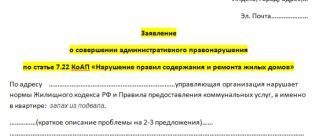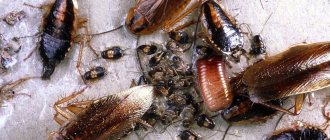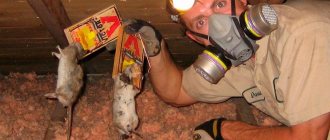Almost every resident of apartment buildings has at least once in his life encountered the presence of cockroaches or rodents in his apartment. But this does not mean that people are sloppy, but, as a rule, that employees in the housing and communal services sector are dishonest. After all, mice and insects climb up risers, interfloor ceilings and ventilation from basements. They create unsanitary conditions and cause fear along with disgust. If the basement is dirty, damp and dark, these are factors that contribute to the appearance of “uninvited tenants” there, as well as an unpleasant odor. We will tell you how to deal with these problems and discuss the cleanliness of the walls in the entrance.
Reasons for the appearance of rats in the basements of high-rise buildings
There are more than 60 species of rats in the world. Most of them are synanthropic animals, that is, their existence is directly related to people and their homes. The most common species (gray and black rats) try to stay close to people. This makes it easier for them to find food, as well as a reliable and even very comfortable shelter.
In the basement
City rats often live in apartment buildings. They are attracted to damp and warm basements, garbage chutes filled with “delicious” waste, and secret technical corridors where they can safely hide and calmly raise their offspring. The cause of rodents may be:
- poor-quality cleaning at the entrance (for example, if garbage bins are not treated with special means);
- untimely removal of garbage, which accumulates in the garbage receptacle chamber and emits an increasingly strong odor;
- deposits of construction waste near the house or in the basement.
The risk of rats settling in an apartment building is higher if there is a grocery store or warehouse in the basement or on the first floor.
Inscriptions on the walls in the entrance
When leaving the house and waiting for the elevator, it’s not entirely pleasant to read something like “Misha is a fool” on the wall, and sometimes even more vigorous inscriptions. Unfortunately, young people have always gravitated towards “rock painting”. This is a problem, I’m not afraid to say with confidence, of every home in our country, as well as the advertisements posted everywhere.
According to the Rules and Standards for the Technical Operation of the Housing Stock, which we have already mentioned a thousand times, housing department employees are required to paint over the inscriptions on the walls and wash them of dirt. We'll tell you where and how to write if they don't. And, once again, let us remind you that you pay monthly for the maintenance of your home.
The following video will tell you how law enforcement agencies fight against those who like to write on the walls in the entrance:
Where to go
We won’t repeat ourselves too much; it has already been mentioned many times that the main body of influence on unscrupulous “utility providers” is the State Housing Inspectorate. Together with her, it is advisable to contact Rospotrebnadzor, as an organization that monitors the poor quality of services to the population.
How to draw up an application is described in detail in the above paragraphs. We slightly change the wording in the main text - and the complaint about the dirty and scribbled walls of the entrance is ready. You can her.
Sample complaint about dirty and scribbled walls of the entrance
Sample complaint about dirty and scribbled walls of the entrance - 1
Sample complaint about dirty and scribbled walls of the entrance - 4
Sample complaint about dirty and scribbled walls of the entrance - 3
Sample complaint about dirty and scribbled walls of the entrance - 4
Necessary actions
The sequence of actions also does not differ from measures taken in the event of a smell from the basement and the appearance of rodents there. Read the previous paragraphs carefully and follow the algorithm specified there. Don’t forget that even if an appeal to the housing inspectorate does not produce results, there are always higher authorities, for example, the prosecutor’s office and the court.
We hope that after reading everything we have written, you will be able to effectively influence lazy or careless employees in the housing and communal services sector. After all, it’s always nice when you are surrounded by a clean entrance, without unnecessary odors and “uninvited guests.” Fight for your comfort, and we will be happy to help you with competent advice.
How do rats get into houses?
If they want, rats can get anywhere. Several factors contribute to this:
- these animals are very smart;
- rats have strong teeth with which they can chew through almost any material;
- Rodents jump quite high, climb vertical surfaces quite well and can even crawl into a narrow hole.
As soon as they appear in the yard, the rats immediately begin to explore the area and look for ways to enter the building. They know how to think logically, analyze information and draw conclusions. In addition, animals can act together.
Rats usually occupy the basement first. They can get into it through the door, technical openings, and communication joints. If there is even a small gap, rodents can easily chew through a passage (even in concrete).
Once in the basement, the rats begin to explore the entire building, moving through ventilation shafts, along sewer and water pipes, between ceilings, and inside walls.
“Intelligent” rodent: what is it like?
- Mostly, a person is bothered by the gray rat (pasyuk). Belongs to mammals, order of rodents. A synanthropic animal that has occupied all territories suitable for its habitat. It is considered the largest predator of its species in the vastness of the Russian Federation.
- The length of its body is from 17 to 25 cm, the tail itself is 19 cm in size. The fur coat is a beautiful gray shade. The fur is heterogeneous. It varies especially on the back and abdomen. There are exceptions - black rats.
- Pasyuk leads a nocturnal and evening lifestyle. Settles near (or in) a person’s home. Can exist in a group, alone or in a colony.
- Each group has its own “sphere of influence,” a territory marked with a special pheromone.
- Rats have nests that they protect. The path to the nest, wherever it is, is unmistakably found.
- Once a route has been laid, away from heavy traffic (along pipes, baseboards, along walls), it is immediately remembered and does not change.
- The basement rat feeds on food rich in animal proteins. Does not neglect waste and fodder. They attack young birds and animals.
- The rodent constantly needs food, on average 25 g per day and water (35 ml). Without food, rats die after 4 days, while without water, death occurs even earlier.
- The most formidable weapon of these animals is their teeth, which do not stop growing throughout their lives. They chew through wires and soft metal objects made of tin, copper, and lead.
- The life cycle is 3 years at best. But due to the high mortality rate of young shoots, only 5% survive to this age. The remaining individuals have a life span of about one and a half years.
What are the dangers of such a neighborhood?
Rats in the entrance area pose a serious threat to both the health and property of all residents. Rodents can cause a lot of trouble, for example, chewing electrical and telephone wires, network cables. As a result, residents may be left without the Internet or without electricity. A hungry or cornered rat forgets about its fear of people and can attack and bite.
At the entrance
Rats also carry pathogens of many dangerous diseases, such as:
- plague;
- typhus;
- rabies;
- tularemia;
- toxoplasmosis.
We must also take into account the fact that basement rats will not sit in the basement for long, because so many delicious smells come from the apartments. Rodents enter apartments through ventilation, from sewer risers, through cracks in the walls or floor.
Once in an apartment, rats will eat food, leave their excrement, and damage furniture and things. And most importantly, they will run everywhere, spreading dirt and infection.
Existing methods of control
Not everyone has the patience to wait a month until the Housing Office deigns to take action (at best). What can you do on your own?
The ratcatcher cat is expensive
- Get a cat, or even better, a cat and a dog. These natural enemies of the rat fraternity do an excellent job of reducing the population.
- Place rat traps and place poisoned baits. Here you need to be careful if there are pets in the house.
- Use ultrasonic repellers that force rats to leave the apartment under the influence of ultrasound.
But all these methods will be ineffective if you do not maintain cleanliness in common areas and leave ways to enter the building. And understand that no matter how careful and cunning these intelligent animals are, humans must always be at the forefront in the fight against them.
Check out articles on similar topics
- DIY rat traps
- Ultrasonic rat and mouse repeller
- Ways to fight mice using folk remedies
- What is the difference between a mouse and a rat: an overview of characteristics
Comments
leave a comment
How to get rid of rodents yourself?
Residents of the house can try to get rid of rats in the house on their own. Most often, the following methods are used for this:
- rat traps - stores offer a large selection of devices for catching rats, the main thing is to choose the right bait, and also secure the rat trap so that the rat does not take it away;
- ultrasonic repellers - a certified device will really help drive away rodents (but this method has a drawback - a high-quality device is not cheap);
- glue traps are a simple and affordable option for rodent control, the downside is that the rats, once stuck, will die for a long time and painfully, emitting a high-pitched squeak.
You can try feeding several cats so that they hunt rats in the basement. But it is worth considering that these must be adult animals with a hunting instinct. Otherwise, the result may be a shameful flight of cats after the first meeting with rats.
But it is not recommended to remove rats yourself using chemicals. It's better to leave this to the professionals.
We turn to professionals
Our company professionally deals with the deratization and extermination of rats in Moscow and the Moscow region and the prevention of their occurrence. Before starting work, we carefully inspect basements, ground floors, adjacent areas, and, if necessary, roofs and attics of apartment buildings.
In our work we use special preparations that we spray using hot and cold fog, as well as using smoke bombs. When using them in the basement, we must notify all residents of the house. All necessary licenses and sanitary documents are available. Contact us to get rid of an unpleasant neighborhood.
Professional deratization by SES specialists
Professional pest control will help you effectively get rid of mice and rats in your home. Residents can contact the SES or a commercial company of the appropriate profile. Specialists will assess the situation, the scope of work and offer the most effective solution. Modern equipment and powerful tools available in the arsenal of professionals will allow you to exterminate the entire colony in one treatment.
Deratization
Contacting specialists is the best way to remove rats as quickly and efficiently as possible. The downside is that the cost of such services is quite high, especially if we are talking about an apartment building.
Number control
If the presence of mice is detected in different parts of the same house (for example, on the upper and lower floors), this indicates that there are several separate colonies of mice operating in the house, each of which has a different population. In this case, it is necessary to exterminate each such group.
In a colony securely established in a privileged territory (the kitchen), the male dominates. The family also includes two reproductive females and 15–20 young mice. It is easy to calculate that if a tenth of a 200-apartment residential building contains mice, then at least 800 individuals will have to be destroyed. Every day these rodents leave behind 56 thousand characteristic traces of droppings. The mice will continue to reproduce because the reproductive rate of an adult female is 30–60 mice annually. The period of puberty of the litter begins already in the third month after birth.
The solution to the problem of controlling the number of rodents is largely due to the coordinated actions of residents and housing offices with special sanitary inspections. In the absence of interaction with the relevant authorities, the residents of the high-rise building will catch and destroy the youngest and most inexperienced representatives of the rodent family. At the same time, reproductive females will quickly make up for numerical losses.
The following are excerpts from an intensive pest control program that has been effective even in dilapidated residential buildings where large numbers of mice have been reported.
An initial inspection of the premises involves a thorough examination of all rooms in the apartments of a multi-storey building. Treatment is carried out depending on the estimated number of mice.
Before treatment begins, residents should empty bottom kitchen cabinet drawers, closets, and clean the stove and refrigerator.
The pest control specialist must be accompanied by a representative of the housing organization, who will open the locks and provide access to the basement and attic spaces and help perform other auxiliary work. The room is thoroughly cleaned of mouse droppings - this will allow fresh droppings to be quickly detected during the next inspection.
Based on the results of the inspection, a report is drawn up, which indicates the estimated number of mice, as well as deficiencies identified during the inspection related to the unsatisfactory condition of the house.
Crevices and openings that provide mice with unhindered access to power sources must be promptly repaired or sealed. Small ones - immediately, large ones - within a week.
Each apartment where mice are found is included in the list of premises subject to repeated treatment in the current month. During this period, mousetraps must be placed in the apartment. Litter should be removed regularly in order to judge the number of rodents by the number of new particles.
The frequency of inspection is once or twice a month until the mice are destroyed. The deratization process can take four to five months.
How to force the management organization to destroy rodents in the house?
It should be kept in mind that even if one rat was spotted in an apartment, this is a sure sign that a colony of rodents is already living in the house. Since rats almost never settle in apartments, but come to them only in search of food.
The management company is responsible for the maintenance of common property, ensuring the safe living of citizens, and compliance with sanitary standards. Her responsibilities include ensuring regular deratization and disinfestation of common areas, which include basements, technical rooms, stairs and landings, elevators and elevator shafts, and common corridors.
So the first authority to contact if rats appear in the house is the management company. Residents need to write a statement in which they demand pest control, referring to regulations, the Decree of the State Construction Committee and the Rules for the maintenance of common property.
The application is submitted to the Criminal Code, receives a mark of acceptance and waits for a response within the 10 days required by law. After this period, representatives of the management organization are obliged to provide a response and set deadlines for carrying out measures to exterminate rodents.
It’s much easier to call a disinfectant for a separate apartment or private house
Since residents in private houses and apartments are responsible for the sanitary condition, it is they who must contact the disinfection services to exterminate rats.
Our practice shows that of all residential premises, it is generally easiest to remove rats from private houses. There are several reasons for this:
- Here the owner has access to all premises, to all buildings and utilities, and therefore, rats can be found wherever they can hide and move. In most cases, it is even possible to find their nests.
- The entire habitat and movement of the rat is limited to one house and the area near it. There will be no situation where a disinfectant starts poisoning rats on the first floor of a multi-story building, the rats safely move to the basement, but the customer does not have the keys to the basement, and it is impossible to get rodents there. Near a private house, in all rooms where rats can move, they can be found.
- In private homes, the owner makes a quick decision to call the service, and we manage to poison the rats before they begin to breed. There is no bureaucracy and long chains of people making (or postponing making) decisions.
Only in private houses (and even then, not in all) can we poison rats with carbonation - this method allows us to kill them all in one day. Although in general this procedure is complex, expensive, and usually better replaced by the use of traps and poisons.
Rats on a glue trap where this trap does not threaten any other animals - in the receiving room under the garbage chute (garbage from the garbage chute is poured into a container, and there is a trap under the container)
In apartments, the fight against rats is complicated by the fact that pests can move into neighboring rooms, get out into the entrance, and therefore they need to be dealt with by measures that prevent the rat itself from meeting the disinfectant. If a rat feels danger in the apartment, it may not return here for a very long time.
On the other hand, we have had many cases when we were called into an apartment, and we successfully poisoned the rats of these rats outside the apartment. For example, a disinfectant can detect rat passages from an apartment to the site to the garbage chute, or to the street to the trash heap, set traps here, outside the apartment, and catch the rats here. They will no longer appear in the apartment.
Case from practice
During one of the calls on the outskirts of Moscow, Kostya, residents of several apartments in one residential building reported that they see rats almost every day, either on the balcony or in the kitchen, and all these rooms were on the same side of the front door where the garbage chute was located. Kostya suggested that the rats move throughout the house precisely through the garbage chute, and enter apartments through windows that were less than a meter away from the garbage chute. It was in and behind the garbage chute that he placed bait stations. After a week, the rats were no longer noticed, and after a few weeks, the janitor reported that in the utility room into which garbage from the garbage chute is poured, he found a lot of dead rats. Apparently, this is where they lived, traveling in search of food through garbage chutes throughout the house.
As a rule, rats never live in an apartment, because it is too restless for them. Twice during our entire practice we found their nests on balconies littered with rubbish. In all other cases, when we were contacted to remove rats from apartments, the rodents lived outside the apartment and only entered here in search of food.
Rat's nest in the attic of a house
On the one hand, this makes the fight easier, because outside the apartment, in places inaccessible to pets, you can set traps and lay out bait, and the rats will die in them. On the other hand, sometimes this can be associated with difficulties in baiting rats: you need to be able to figure out where outside the apartment they live and run. It is easier to find and physically kill them in a small apartment than in a large house, and even more so on the street.
In any case, the disinfector deals with each situation individually and makes the best decisions in it. If this is, of course, a competent exterminator.
What to do if the management company or HOA ignores the need to combat rodents?
If rats are found in an apartment, entrance or basement, the management company has received a statement from the residents, but ignores it, the next step must be taken. Residents of the house can complain to Rospotrebnadzor, the Housing Inspectorate, and the prosecutor's office. The complaint should state the situation, attach a copy of the application, the response of the management company (or note that there was no response) and demand that an inspection be carried out against the management company, as well as oblige it to carry out the required deratization measures.
Such applications are considered within 30 days. If, based on the results of the inspection, the fact of violations is established, this threatens the management company with serious problems, including revocation of the license.
Algorithm for solving the problem
Owners of housing stock in multi-apartment buildings have only one counterparty for communication - the management company. The organization assumes responsibility for solving the main problems of residents. This is, in principle, why it was created. Control over activities is carried out by several government agencies:
- prosecutor's office;
- Rospotrebnadzor;
- housing inspection.
An algorithm of actions emerges from the described mechanism of interaction between apartment owners and organizations of different forms of ownership. Briefly it can be stated as follows:
- Filing a complaint to ;
- The reply is in process;
- Contacting the controlling organization;
- If the issue is not resolved, then organize a general meeting of owners in order to develop an alternative solution to the problem.
Step 1: contacting the management company
At the first stage, one should proceed from the responsibility of utility companies. Therefore, you can contact them by phone. The algorithm is as follows:
- Call the hotline or the dispatch service and find out the name and position of the interlocutor (you need to write it down);
- Provide the following information: type of pest;
- exact address of the building and entrance;
- personal data of the applicant;
There is a schedule for disinfection of buildings under management. If they receive an application, they are required to turn on the applicant's entrance first. However, this does not happen every time. After all, there are a lot of complaints, people do not have time to process all applications instantly.
Step 2: collective complaint
If within three days the managers have not taken any measures, then they need to act further . Negligent employees need to be put under pressure. The plan is:
- Make video recording:
- places where pests accumulate - cockroaches in the entrance;
- house numbers;
- Make an appeal;
- Collect signatures from neighbors;
- Send to .
The application shall indicate the following information:
- In the header:
- destination;
- personal data of the representative of the applicant group in the format: Full name;
- residential address;
- contact number;
- The body logically presents the following information:
- type of pests and their location;
- date and time of telephone call;
- position and full name of the specialist who received the call;
- fact of lack of reaction;
- please take urgent measures to eliminate the infestation;
- List of applications (photos or video materials);
- Date and signatures of residents indicating:
- apartment numbers;
- surnames and initials.
Methods for filing a complaint
You can transfer the prepared materials to utility workers in one of the following ways:
- bring in person and receive registration details (priority);
- send by mail with a list of attachments and delivery notification;
- download on the company's official website.
Step 3: Waiting for a response
The period for consideration of the owner's appeal must be specified in the agreement with the company.
This was compiled during the transfer of functions. Therefore, the document needs to be found and studied. As soon as the deadline expires, you need to inquire about the decision made. If the management agreement does not stipulate such a period, then it will refer to Law No. 59-FZ, which provides for a 30-day period for consideration of appeals.
Step 4: Complain about
If the steps described above do not produce results, then you will have to proceed further.
You can seek control over public utilities in the housing inspection and Rospotrebnadzor, as a body that protects the rights of consumers of any services (including), as well as carrying out state sanitary and epidemiological supervision. You can also contact local authorities. They have powers in the field of epidemiological protection of the population. The algorithm of actions is as follows:
- Write an appeal addressed to the head of the city or district;
- Collect signatures from residents;
- Make copies of letters and additional materials;
- Send to address.
The application is written according to the above scheme. Additionally, the body should reflect previously taken measures, citing a collective complaint and lack of results. In addition, you need to duplicate the appeal to the prosecutor's office. The text is the same. You can immediately indicate two addresses in one letter (make two copies).
You can appeal the inaction of managers to Rospotrebnadzor. The government agency controls the provision of services to the population. He organizes inspections of utility workers. A complaint to Rospotrebnadzor can be downloaded on the official website. She will be sent according to her territorial affiliation to the appropriate unit.
The disadvantage of this method is the length of time it takes to wait for a response. During this period, neither the rodent nor the cockroaches will disappear.
A shabby housing officer
Every month, special services are required to carry out deratization using baits, traps or gels. When rodents have multiplied, we can talk about the failure of the service organization to fulfill its duties, for which it can be held accountable.
You need to complain about the appalling situation consistently.
Creating unsanitary conditions in the back rooms of a store and ignoring preventive measures on the part of its management threatens with sanctions after citizens file a complaint with the same Rospotrebnadzor. In particular, to the imposition of a fine, according to the Code of Administrative Offenses of the Russian Federation. Existing methods of control Not everyone has the patience to wait a month until the Housing Office deigns to take action (at best).
What can you do on your own? The ratcatcher cat is expensive
- Get a cat, or even better, a cat and a dog. These natural enemies of the rat fraternity do an excellent job of reducing the population.
- Place rat traps and place poisoned baits.
Citizens have the right to apply personally, as well as send individual and collective appeals, including appeals from associations of citizens, including legal entities, to state bodies, local governments and their officials, to state and municipal institutions and other organizations entrusted with the implementation of publicly significant functions, and their officials. Part 1 of Art. 2nd Federal Law of May 2, 2006 N 59-FZ “On the procedure for considering appeals from citizens of the Russian Federation” Good evening, I have the same problem, I live on the first floor, one apartment on the site, next to the front door there is an electrical panel and there rats live. In general, they go there for their own needs, in general there is unsanitary conditions, the housing office does not take any action.
Rats run in herds
And the management company is inactive. St. Petersburg residents turn to the “Public Reception of the Baltic Media Group” with various problems, but, as a rule, they are typical for our city - be it leaks or bad roads. The problem that Tatyana Ivanovna Orlova, whose family lives on Pridorozhnaya Alley in house No. 21, came up with is, unfortunately, also typical - rats. Photo: Interpress DERATIZATION MUST BE CARRIED OUT REGULARLY “I ask you, help me figure out where to go about a rat infestation,” writes Tatyana Ivanovna. - We live on the first floor. Rats run in herds in the basement, up the stairs, through garbage disposals, down the street. Twice now they have gnawed through the wall from the basement into our kitchen. One - healthy - was running around the kitchen a year ago, the second was heard the other day - she was gnawing on the baseboard. We moved the sink and saw a hole about forty centimeters to the right from last year, which we cemented.











